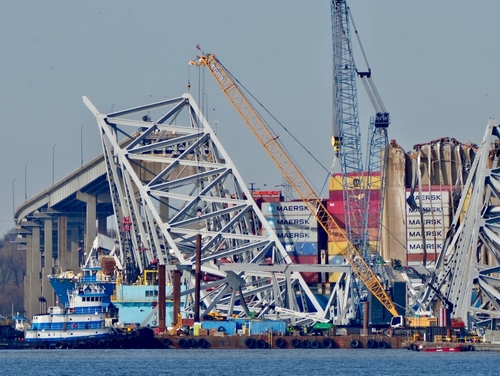
On Tuesday, the U.S. Department of Justice filed a claim in U.S. District Court for the District of Maryland against the owners and operators of the motor vessel DALI, the container ship that hit the Francis Scott Key bridge in Baltimore.
Officials with the DOJ said they would seek more than $100 million in costs incurred to reopen access to the Port of Baltimore, as well as seek punitive damages for the owner and operator’s reckless conduct.
On March 26, DALI left the Port of Baltimore bound for Sri Lanka. While navigating through the Fort McHenry Channel, the vessel lost power and struck the bridge, causing it to collapse and fall into the water below. The bridge collapse killed six people and obstructed the channel, brining shipping into and out of the port to a standstill for months. Officials said the loss of the bridge also severed critical highway connections and impacted a key artery for local commuters. The DOJ said the accident was caused by carelessness and gross negligence on the part of Grace Ocean and Synergy.
“The Justice Department is committed to ensuring accountability for those responsible for the destruction of the Francis Scott Key Bridge, which resulted in the tragic deaths of six people and disrupted our country’s transportation and defense infrastructure,” U.S. Attorney General Merrick Garland said. “With this civil claim, the Justice Department is working to ensure that the costs of clearing the channel and reopening the Port of Baltimore are borne by the companies that caused the crash, not by the American taxpayer.”
The United States government led the response efforts of federal, state and local agencies to remove nearly 50,000 tons of debris from the channel and from the DALI itself. The claim alleges that while the removal operations were underway, the United States cleared a series of temporary channels to relive the port’s bottleneck and to mitigate some of the economic devastation caused by the bridge collapse.
“The owner and operator of the DALI were well aware of vibration issues on the vessel that could cause a power outage. But instead of taking necessary precautions, they did the opposite,” Principal Deputy Associate Attorney General Benjamin C. Mizer said. “Out of negligence, mismanagement, and, at times, a desire to cut costs, they configured the ship’s electrical and mechanical systems in a way that prevented those systems from being able to quickly restore propulsion and steering after a power outage. As a result, when the DALI lost power, a cascading set of failures led to disaster.”
Since the bridge collapse, both Grace Ocean and Synergy have sought to exonerate or limit their liability to approximately $44 million.